Basement waterproofing
Do you finally want a dry basement? We specialize in electrophysical basement waterproofing, which we have been carrying out since 2010 with the ÖNORM-approved DRYMAT® system.
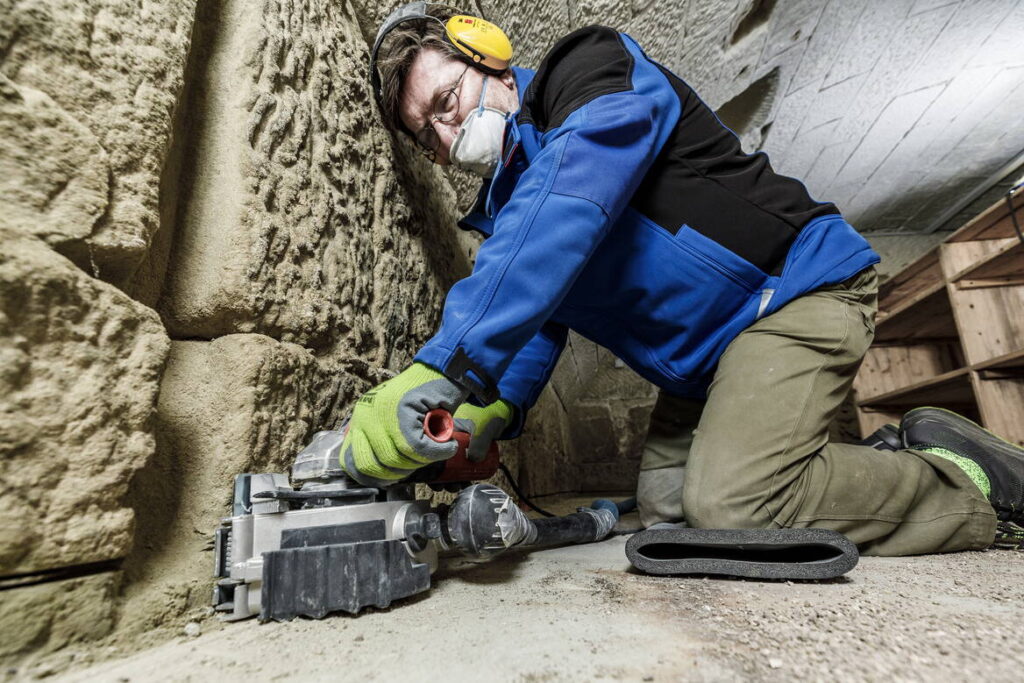
Homepage › Basement tanking
Trenchless basement waterproofing from the inside
Why does moisture penetration of the basement wall occur? In most cases, the actual problem is not moisture or leaky walls, but certain properties of the building substance that cause the wall to absorb moisture via the capillary effect, similar to a sponge. This capillary effect occurs more strongly the more the building substance of the basement wall is negatively charged electrically.
With the DRYMAT® system, we induce a positive electrical potential in the basement wall. This eliminates the capillary effect. This effectively protects the wall from moisture. Incidentally, the same principle is also used for sportswear, where the electrical potential of a small button battery is used to actively conduct moisture out of the clothing.
As part of electrophysical cellar dehumidification, the wall is only induced with a positive electrical potential. This means that hardly any current flows and there is no exposure to electrosmog in the house. DRYMAT® basement waterproofing is minimally invasive and requires no solvents or injections. Ask us without obligation.
Our services
- Careful analysis of the causes of moisture, if necessary expert opinion
- Electrophysical basement waterproofing with the DRYMAT® system
- Acceleration of cellar drying with intelligent cellar ventilation
- Measurement of residual moisture 18 months after installation
Your advantages
- Advice from experienced civil engineers and building biologists
- Cost-effective basement waterproofing from the inside without digging up
- Certified DRYMAT® system with success guarantee
- Waterproofing without toxic chemicals, healthy for people and the environment
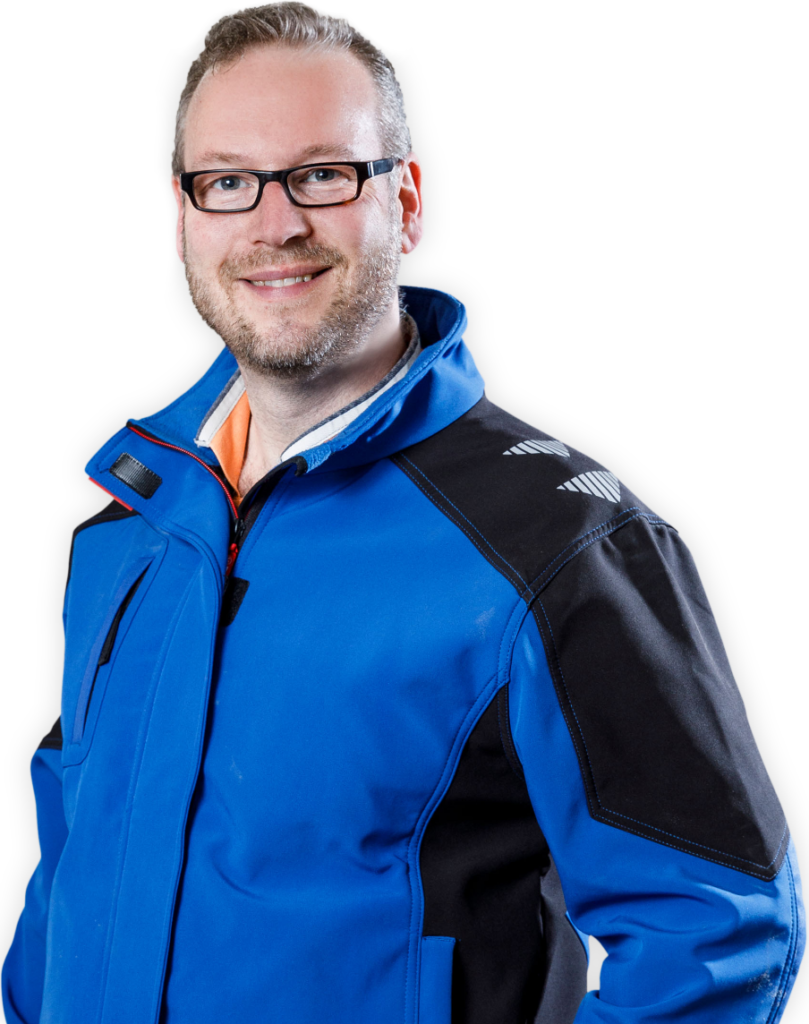
Contact us without obligation
Do you have any further questions or may we prepare an offer for you?
Get in touch with us without obligation. We look forward to your inquiry!
Get in touch with us without obligation. We look forward to your inquiry!
Tobias Bayer
Managing Director
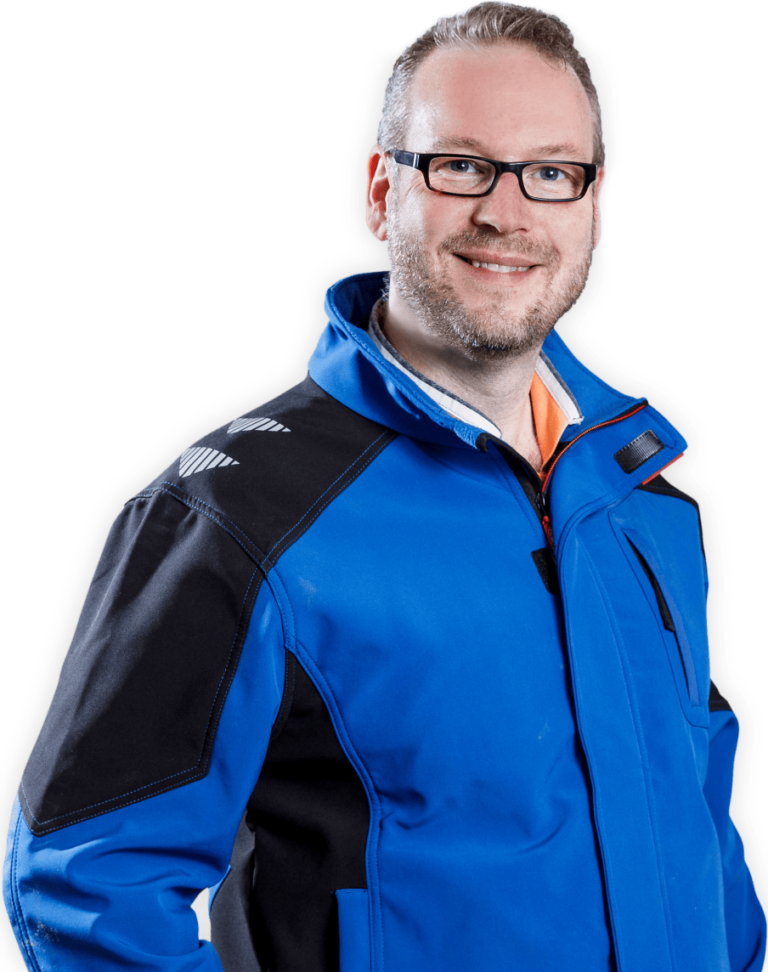
Questions & Answers
- General
- Costs
- Functionality
- Application area
- Implementation
What is the cost of basement waterproofing?
Electrophysical basement waterproofing from the inside with the DRYMAT® system costs EUR 15,000 to 20,000. This estimate is based on a house with a floor area of 60 m². The exact price depends on the following factors: Travel distance, length and accessibility of the wall, building material and aesthetic requirements. In comparison, manual basement waterproofing from the outside quickly exceeds these costs by a factor of three, partly due to the time-consuming earthworks.
What consequential damage can occur with damp masonry?
Moisture leads to higher heating costs, causes damage to the building fabric and thus continuously reduces the value of the property. If mold starts to form, it also creates an unhealthy climate in the affected rooms. This can lead to headaches and respiratory illnesses.
How does electrophysical basement waterproofing work?
An electrical potential is generated with the DRYMAT® control unit and electrodes installed in the cellar wall. This counteracts the suction tension in the wall. In this way, moisture can no longer be transported into the wall and rise upwards. The residual moisture in the wall evaporates over time. In this way, the wall is permanently protected against penetrating water and the cellar wall dries completely within 0.5 to 3 years.
Why basement waterproofing from Haustrocknung.de?
We are an owner-managed Swiss company and have been using the method successfully since 2010. Compared to conventional methods, electroosmotic basement waterproofing with DRYMAT® is safer, cheaper, more ecological and ÖNORM-certified. While DRYMAT® can be installed in the cellar wall in a minimally invasive manner, conventional methods usually involve extensive intervention in the building structure.
How much does basement waterproofing cost?
Electrophysical basement waterproofing with DRYMAT® costs around EUR 15,000 to 20,000 for a detached house with a floor area of 60 m². This includes the entire order processing - from the careful analysis of the cause of the moisture to the installation of the DRYMAT® system and the follow-up measurement. Request a quote now
On what factors does the price of basement waterproofing with DRYMAT® depend?
The price depends on the following factors: length and accessibility of the walls, building material, aesthetic requirements and the length of the journey. In addition to the installation of the DRYMAT® system, careful analysis of the cause of the moisture is an expense. We do this in order to be able to guarantee the results.
What are the annual electricity costs?
The DRYMAT® system generates annual electricity costs of around EUR 50. This consumption is primarily due to the control unit.
Does DRYMAT® incur maintenance costs?
No, the DRYMAT® system does not incur any maintenance costs. We make the entire installation out of titanium. We give you a 10-year guarantee on the control unit. You also receive a further 10-year manufacturer's warranty. You receive a 2-year guarantee on the installation in masonry in accordance with SIA.
How does electrophysical basement waterproofing work?
Moisture can only rise in the wall if the building fabric has a negative electrical charge. With the DRYMAT® system, we ensure that the cellar wall is positively charged in relation to the ground. On the one hand, this prevents new water from penetrating the building fabric, while on the other, the excess moisture evaporates within 0.5 to 3 years. This process can be controlled with an intelligent Basement ventilation be accelerated.
What are the advantages of basement waterproofing with DRYMAT®?
Both the DRYMAT® system and our application procedure are scientifically recognized and ÖNORM-tested. While conventional waterproofing methods using construction chemicals or resins are environmentally harmful and require extensive intervention in the building fabric, the DRYMAT® system is ecologically harmless, can be installed with minimal invasiveness and also actively combats moisture.
How reliably does basement waterproofing with DRYMAT® work?
In the case of non-pressing moisture sources, such as seepage water or ground moisture, we guarantee the measurable results of the DRYMAT® system. In the case of periodically pressing slope water or an adjacent water vein, the electrical potential will at least cause the masonry to dry out more quickly. In any case, we carry out a thorough analysis of the cause of the moisture.
What to consider in terms of basement waterproofing?
Hermetically sealing the building fabric inevitably increases the risk of consequential damage such as mold. Basement waterproofing should therefore, if possible, not hermetically seal off the building fabric, but ensure that the wall can continue to «breathe». More on this in guide «Waterproofing the basement»
Why do basement walls become damp?
In most cases, it is not the leak in the wall or the source of moisture that is the real problem, but the nature of the building fabric: this causes the moisture to be absorbed by the cellar wall via the capillary effect, similar to a sponge. However, this capillary effect only occurs if the building fabric has a negative electrical charge. More on this in the «Damp walls» guide
How does DRYMAT® seal damp basement walls?
By inducing a positive electrical potential in the wall, the capillary effect is eliminated (so-called electroosmosis). Whereas the capillary effect was previously responsible for the "rising" of moisture, it can now no longer transport the moisture in the building fabric. Incidentally, the same principle is also used in modern sportswear to remove moisture from clothing.
In what cases can electrophysical basement waterproofing be used?
The DRYMAT® system is effective for non-pressing sources of moisture. In the case of pressing slope water or an adjacent water vein, the electrical potential of DRYMAT® is strong enough to dehumidify the building structure. In all cases, we carry out a thorough analysis of the cause of the moisture beforehand.
When is electroosmotic basement waterproofing not effective?
An oppressive source of moisture makes it difficult for the electrical potential of the DRYMAT® installation to dry the building effectively. However, dehumidification of the building fabric is achieved safely. Pressing moisture sources include adjacent water veins or pressing slope water. We always start by carrying out a thorough analysis of the cause of the moisture, as this enables us to guarantee the results.
What is the procedure of electrophysical basement waterproofing?
After the free initial telephone consultation, we will prepare a quotation for you. If you accept the offer, we will first carry out a detailed analysis of the cause of the moisture at your premises, where we will take various measurements. If there are no underlying conditions that rule out the use of electrophysical basement waterproofing, we install the DRYMAT® system. 18 months later, we carry out a moisture measurement to check the drying effect.
How long does basement waterproofing with DRYMAT® take?
The installation of the DRYMAT® system takes around 3 - 5 days for a detached house. The building fabric is then effectively protected against penetrating moisture. It can take 0.5 to 3 years for the excess moisture in the building fabric to dry out. Drying can be achieved with an intelligent Cellar ventilation be accelerated.
Does the installation of DRYMAT® create noise or dirt in the house?
When we cut the slots for the wiring into the wall, noise is generated in the rooms concerned. However, there is very little dust because we mill with an extractor hood and a connected industrial vacuum cleaner.
How is the effectiveness of DRYMAT® monitored?
We monitor the effectiveness of the DRYMAT® system with a moisture measurement 18 months after installation of the system. This should reveal a significant reduction in residual moisture in the building fabric.
C. T. from Zurich says:
«The installed DRYMAT® system copes with the difficult task. In previous years, I had real water ingress through the stamped concrete in the basement. But that has failed to happen with the intense rains of the last few days! The electrophysical DRYMAT® system really seems to be ideal.» ➝ other references
Cost of basement waterproofing
The DRYMAT® system costs between EUR 15,000 - 20,000 for a house with a floor area of 60 m². This includes a thorough analysis of the moisture problem by a building expert, installation of the system and follow-up measurements. Operating costs of around EUR 50 per year are also included.
The exact price is influenced by the following four factors:
- Duration of the journey: How far away is the property?
- Accessibility of the affected walls: Do fixtures make installation work difficult?
- Construction material of the walls: How complex is the installation in the affected building material?
- Aesthetics: Do requirements for aesthetics complicate installation work?
Methods of basement waterproofing at a glance
Electrophysical basement waterproofing is able to dry out the building structure down to the bottom of the foundation. In contrast to the vertical and horizontal waterproofing methods, basement waterproofing with the DRYMAT® system requires neither structurally delicate interventions nor the use of delicate chemicals. More info in the guide «Waterproofing the basement»
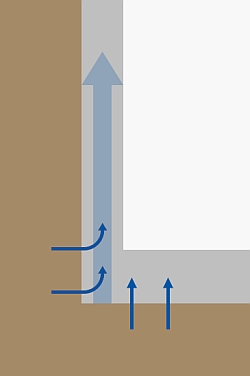
Rising damp
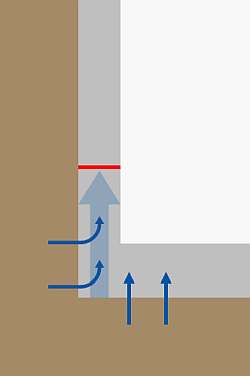
Principle of the horizontal barrier
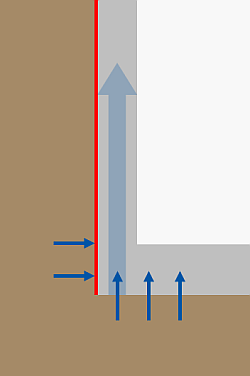
Principle of the vertical barrier
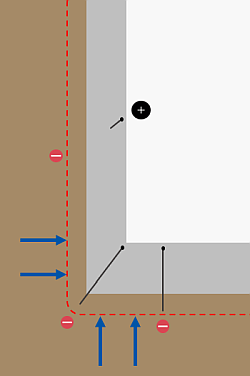
Electrophysical barrier
Before and after basement waterproofing with the DRYMAT® system
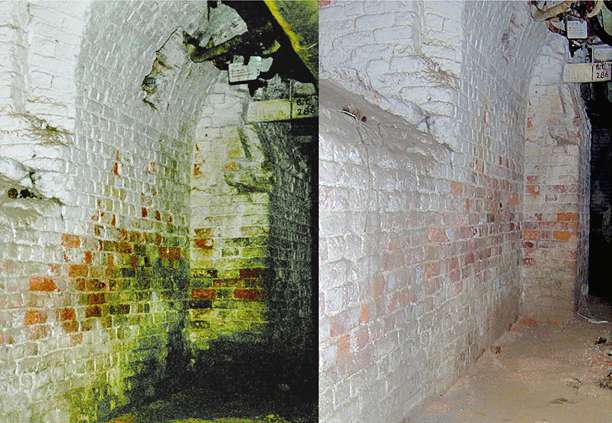
Order processing
- After contacting us, for example via the contact form, our building experts will call you for an initial consultation. Together, we will specify the moisture problem and show you potential countermeasures.
- If you are interested, the second step is for us to come to the affected property to take a closer look at the moisture problem on site. For this purpose, we carry out various measurements on the building fabric.
- Thirdly, we prepare either a quotation or a building survey for you. You then decide whether you want to accept the offer.
- If yes, in the fourth step we start the installation of the DRYMAT® system. This takes about 3 - 5 working days for an average single-family house with a floor area of 60 sqm.
Installation procedure: We drill electrodes into the damp masonry as well as into the floor and mill narrow slots. Then we lay the cabling, mount the control unit and test the system. The milling work causes noise in the basement. There is little dust because we drill and mill with an industrial vacuum cleaner connected. - After successful testing, in the last step we plaster the slots and put the plant into operation. If you wish, we will perform one or more periodic re-measurements.

